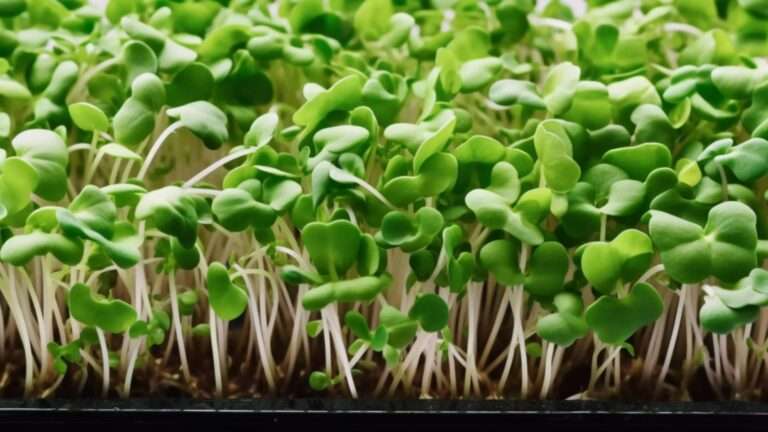Selling Microgreens in Georgia: A Breakthrough Business Opportunity
Some of our posts on Microgreensguru.com contain affiliate links. If you click on an affiliate link and make a purchase, we may receive a commission. Clicking on an affiliate link that earns a commission does NOT result in additional charges or costs you extra. Earnings from affiliate links help keep this website running. See our full affiliate disclosure here.
Microgreens are one of the hottest trends in specialty crops. These young seedlings of vegetables and herbs offer an intense burst of flavor, vivid colors, and very high nutritional density. It’s no wonder more and more farmers are adding microgreens to their production plan or starting microgreens businesses from scratch.
Georgia is an excellent state to grow and sell microgreens. The climate allows for year-round production with proper protection from the elements. Plus, microgreens align well with consumer demand for fresh, local, nutrient-dense foods in cities like Atlanta and Savannah as well as statewide at farmers markets.
However, like any food product, numerous licenses, permits, and regulations apply to commercially growing and selling microgreens in the state of Georgia. Failure to understand and comply with relevant rules can result in headaches ranging from rejected insurance claims to financial penalties to having your product removed from store shelves.
This guide breaks down all the key permitting, food safety, farming, labeling, and other regulations commercial microgreen growers need to follow in Georgia, including convenient checklists for easy reference. Read on to make sure your budding microgreens operation has all its legal and regulatory bases covered.

Key Takeaways for Selling Microgreens Legally in Georgia
Starting a new farm venture like microgreens should be exciting, not intimidating. While numerous regulations exist, view legal compliance as protection rather than hindrances. Key lessons for smoothly launching a compliant and sustainable Georgia microgreens operation include:
- Choose the right business structure: Weigh options like sole proprietorship vs LLC based on liability considerations and paperwork demands. Most small farms are organized as sole proprietors initially.
- Obtain all required licenses: Never skip registering with city/county/state agencies or paying fees pre-launch. Display certificates prominently onsite.
- Follow cottage food rules: If selling direct to consumers locally without wholesale, this home kitchen permit suffices in most cases.
- Implement food safety protocols: Good Agricultural Practices (GAP) provide an excellent food safety framework for new and smaller growers.
- Prepare for inspections: Expect occasional evaluations of facilities, transport vehicles, storage cleanliness, and handler hygiene by health officials.
- Master allergen controls: Label meticulously but also avoid cross-contamination during growing and post-harvest.
- Renew licenses annually: Mark your calendar for required yearly renewals of permits to operate legally without gaps.
- Ask agencies for guidance: Georgia food regulatory professionals genuinely aim to enable farmers’ success through education.
Getting Started: Business Structure and Licensing
Before diving into microgreens-specific rules, the first step is structuring and organizing your new farming endeavor legally as a business. Like any entrepreneurial venture, you need to consider options for business entities, licensing, and sales tax collection.
Choosing a Business Structure
Most small-scale startups begin as sole proprietorships, which means the owner and the business are legally considered one entity. There’s very little paperwork involved in launching an unincorporated solo venture.
However, sole proprietors receive no corporate liability protections. The owner’s personal and business assets are one and the same. Most entrepreneurs opt to form a type of corporation or Limited Liability Company (LLC) to shield personal assets from any legal or financial issues tied to the business itself.
Both corporations and LLCs require registering your business with the state through an official formation process (articles of incorporation for corporations, articles of organization for LLCs). You’ll also need to stay on top of all annual state reporting paperwork and fees to keep your business’s corporate shield intact.
Table 1. Georgia Business Licensing Needs for Microgreens
| License/Permit | Issuing Agency | Cost | Renewal |
| Business License | City/County | Varies | Annual |
| Sales Tax ID | GA Dept of Revenue | Free | N/A |
| Trade Name Registration | City/County | <$50 | 5 Years |
| GA GATE Certificate | GA Dept of Agriculture | $15 | Annual |
Business and Sales Licensing
In addition to forming a business entity, every microgreens operation must obtain a general business license to operate legally in Georgia.
Business licenses are issued by city and county governments. The process and requirements can vary depending on your jurisdiction, so inquire with your local Chamber of Commerce or development authority.
Aside from a basic business license, if you plan to make any sales, you also need a sales tax ID number. This allows you to collect sales tax from customers, which you then remit to the Georgia Department of Revenue on regular filings.
Trade Names and DBAs
If you plan to operate your microgreens business under anything other than your legal personal name, such as a catchy farm name, you also need to file for a “doing business as” name, commonly shortened to DBA. DBA allows sole proprietors and entities to use an alternative business name, also called a trade name.
Check in with your city or county’s business license office about the requirements to properly register a DBA. For example, in Fairfax County, Virginia, filing a DBA requires submitting a simple Application for a Fictitious Name Certificate.
Proper DBA registration ensures no other business in your state uses the same trade name and also ties the trade name officially to your sole proprietorship or business entity for liability purposes.

Special Georgia Business and Farming Licenses
Aside from universal small business licensing, Georgia has a few special licensing programs commercial microgreens growers should consider, including agricultural sales tax exemptions and food manufacturing permits.
Table 2. Georgia Cottage Food vs. Food Sales Licensing
| Factor | Cottage Food Rules | Food Sales Requirements |
| Production Site | Home Kitchen | Commercial Facility |
| Sale Types | Direct-to-Consumer | Wholesale Allowed |
| Revenue Limit | $35k/year | None |
| Labeling | Cottage Kitchen Disclosure | Standard |
Georgia Agricultural Tax Exemption
The Georgia Agricultural Tax Exemption program, or GATE, allows eligible farmers to avoid sales tax on equipment, inputs, and other items purchased exclusively for ag uses like growing microgreens.
You must submit a GATE application to the Georgia Department of Agriculture to receive a certificate. All GATE certifications expire on December 31 annually, so regular renewal is essential.
Cottage Food Operation License
The GA Cottage Food program allows entrepreneurs to use home kitchens to produce certain food products legally in Georgia. Depending on your microgreens sales plans, obtaining this special license may suffice versus needing a commercial Food Sales Establishment permit (see next section).
Cottage kitchen production limitations include:
- Only non-potentially hazardous goods not requiring refrigeration
- Direct sales to consumers only, no wholesale or internet
- $35k or less gross annual sales
If your microgreens recipes and sales plans fit within the Cottage Food rules, apply for this home processor license through the Georgia Department of Agriculture’s Food Safety Division.
Food Sales Establishment License
Commercial processors of foods intended for end consumer sales need this permit from the state agriculture department’s Food Safety Division as well.
So if you plan to sell microgreens wholesale to stores, and restaurants, or ship online orders out of a dedicated production facility, obtain a Food Sales Establishment license instead of the home Cottage Food Operation permit.
Good Agricultural Practices (GAP) Certification
GAP certification audits growing and handling processes to ensure adherence to defined standards for agricultural products like microgreens.
For small growers targeting direct consumer channels like farmer’s markets, GAP remains voluntary. But gaining certification can provide a marketing advantage and prepare operations considering larger commercial wholesale contracts.

Food Labeling and Safety Regulations
Before microgreens go on sale either directly to consumers or to retail/food service clients, proper labeling and adherence to food safety protocols are essential.
Label Requirements
All food products like microgreens require informative labeling that discloses:
- Business name and address
- Common product name
- Complete ingredients list
- Net weight
- Production method statement (“Made in Cottage Food Operation…”) for home kitchen goods
- Allergen warnings
Georgia follows federal allergen labeling rules. You must call out if microgreens contain any milk, eggs, wheat, soybeans, peanuts, tree nuts, fish, or shellfish either directly in the ingredients or via a separate “Contains” statement.
Handwritten labels are acceptable if legible and durably printed. Stickers and tags work for some sales channels too. But commercial packaging should incorporate printed packaging with professional labeling.
Allergen Precautions
In addition to labeling for ingredients and allergens properly, microgreen growers have an extra duty to prevent cross-contamination in growing and processing areas.
Be very cautious introducing known allergens like wheatgrass or pea shoots into facilities and also growing non-allergenic varieties. Thoroughly clean and sanitize equipment between production cycles. Also, store allergenic and non-allergenic microgreens separately post-harvest.
Packaging Rules
Georgia follows federal standards for produce packaging materials. Containers for selling microgreens cannot impart harmful chemicals during expected conditions throughout distribution and sale before consumer use.
Wholesale clients like grocery stores or restaurants may demand tamper-resistant or other specialized packaging. Ask prospective commercial buyers about any special container requirements early in the sales process.

Selling Microgreens at Farmers Markets
Farmers markets provide an easy entry point to sales for microgreens producers. These events allow direct vendor-to-consumer commerce, perfect for testing products, talking to customers, and building an audience.
While rules vary across different markets, expect to need permits and licenses beyond your underlying business registration. Some additional documentation farmers markets frequently require from vendors includes:
- Product Liability Insurance: Protects sellers and event organizers from financial fallout from injuries or accidents tied to products
- State Sales Tax ID: Confirms vendors properly collect and remit sale taxes
- Food Handler Permits: Verify completion of food safety training to reduce risks of foodborne illnesses
- Organic Certification: USDA-sanctioned validation for marketed organic goods
- Cottage Food Operation License: For home processors, confirms adherence to that program’s production standards
- Health Inspections: May mandate periodic municipal health department evaluations of vendor storerooms, transport vehicles, or on-site processing facilities like mobile kitchens.
Reputable markets always provide full lists of required permits, licenses, and certifications well ahead of the event or selling season.
Table 3. Georgia Farmers Market Permitting Needs
| Permit/License | Purpose |
| Product Liability Insurance | Financial protection |
| State Sales Tax ID | Sales tax collection |
| Food Handler Permit | Verifies food safety training |
| Organic Certificate | Validates organic claims |
| Health Inspections | Evaluates food safety |
Also keep local soil, water, and planting conditions and regulations in mind when selecting which microgreen varieties to grow and sell. For example, markets may prohibit certain plants like watercress over invasive species concerns. Always clear your offerings before committing time and materials to propagation.
Above all, safely transporting and storing microgreens at proper cold temperatures is a prime food safety obligation for public sales venues like markets and special events. Invest in reliable coolers, cold packs, and thermometers specifically for market-day use.

Regulations for Online Microgreens Sales & Shipping
The rise of online shopping and overnight delivery created lucrative sales channels for perishable goods like microgreens barely imaginable just a decade ago. But digital transactions and sending produce across state lines also trigger additional regulations.
At a minimum, properly charging sales tax applies for any ecommerce microgreens orders, especially in the economic nexus era. You need a sales tax ID from the Georgia Department of Revenue for tax collection and reporting regardless of the online sales platform.
Internet sales of food products also often necessitate meeting special requirements or recommendations for safe handling and shipping perishables:
- Only ship freshly harvested microgreens in sound condition
- Use packaging designed to protect delicate greens
- Include ice packs and insulation for temperature control
- Print expiration or use-by dates clearly
- Provide instructions for proper storage/handling
If you want to expand sales beyond Georgia state lines, also investigate federal food shipping rules through agencies like the FDA and USDA. Interstate commerce falls outside the scope of this state-focused guide but absolutely impacts operators with national ecommerce ambitions.
Microgreens Regulations for Restaurants & Grocery Stores
Selling microgreens wholesale to restaurants, institutional food services, grocery stores, and other retail establishments carries tremendous revenue potential but also stricter regulatory requirements versus direct marketing.
In addition to standard business and food safety protections for all growers and producers, commercial clients expect detailed food safety documentation and guarantees.
Managers are ultimately responsible for serving the public demand strong evidence vendors follow sound protocols and maintain high-quality controls throughout growing, harvesting, storage, and transport.
Exactly which food safety verifications buyers may ask microgreen suppliers to show can vary. But commonly requested documentation includes:
- Good Agricultural Practices (GAP) Audit Reports: Confirms farming procedures meet produce industry best practices
- HACCP Plans: Hazard Analysis Critical Control Point assessment reduces food contamination risks
- Water Tests: Validates clean irrigation and processing water supply
- Organic Certification: USDA-sanctioned seals for marketed organic goods
- Proof of Insurance: Demonstrates financial resources to remedy recall events
- License and Inspection Paperwork: Business permits, health department certificates, and other compliance documents
As a microgreens grower hoping to cultivate elite chef fans or land store shelves, thoroughly prepare in advance for commercial clients’ sophisticated Food Safety Modernization Act (FSMA) driven buyer requirements before pitching your wares.
Invest time upfront in formal food safety training for key staff and meticulously document all growing, harvesting, storage, and distribution standard operating procedures. Also, work in small initial batches with any new restaurant or retail relationships before agreeing to supply large consistent volumes.

Key Regulations Checklist for Selling Microgreens in Georgia
To recap the breadth of rules and requirements covered more extensively above impacting commercial microgreens producers in Georgia:
Business Formation
- [ ] Register business entity or sole proprietorship
- [ ] Obtain a business license
- [ ] Apply for sales tax ID
- [ ] File for DBA/trade name
Special Licensing
- [ ] Get Georgia Ag Tax Exemption Cert
- [ ] Obtain Cottage Food Permit or Food Sales License
Food Safety
- [ ] Implement GAP growing/handling
- [ ] Complete allergen control plan
- [ ] Verify packaging compliance
Market Sales
- [ ] Acquire all venue-required permits
- [ ] Pass health inspections
- [ ] Transport greens safely
Online Sales
- [ ] Charge sales tax
- [ ] Use produce shipping materials
Wholesale Sales
- [ ] Prepare food safety documentation
- [ ] Qualify for buyer insurance levels
- [ ] Scale slowly at first
While seemingly daunting at first glance, none of the required Georgia microgreens licenses, regulations, or protocols exist simply to trip up well-intentioned farmers.
Every permit guideline and procedure ultimately aims to protect public health and ensure the fair, equitable treatment of businesses participating in commerce.
Hopefully, this guide provided clarity for microgrowers on properly launching and running a compliant commercial operation in the Peach State.
Final Thoughts: Growing and Selling Microgreens the Right Way in Georgia
Starting a new microgreens farming operation from scratch or adding tiny greens to an existing agricultural business can be extremely rewarding personally and financially. However, properly licensed and safely handled microgreens must be the foundation for both public health and your company’s longevity.
While no entrepreneur wants to drown in paperwork and red tape, legal compliance protects everyone involved – sellers, buyers, consumers, and even competitors. So thoroughly research and implement regulations before a single seed hits the soil.
The checklists contained here plus resources like the Georgia Department of Agriculture and local county offices only exist to support farmers’ success. Rely on these government professionals as partners, not adversaries, when licensing questions arise.
And, above all, never lose sight of the privileged responsibility and trust placed in anyone raising and distributing food, even micro-scale. Georgia’s rich agricultural heritage deserves carrying forward for generations to come through conscious stewardship of resources, science-based safe food handling, and nurturing future farmers.
The promising future of regenerative agriculture and locavore eating relies on micro stewards focused on nourishing land and community. Here’s to growing good together in Georgia the right way – license in hand and health on the horizon.
Frequently Asked Questions About Selling Microgreens in Georgia

Cal Hewitt is the Founder and Lead Cultivator at Microgreens Guru, a website dedicated to empowering individuals to grow, consume, and potentially sell nutrient-dense microgreens. With 5 years of hands-on experience in microgreens cultivation, Cal brings a unique analytical perspective to the world of urban agriculture. He specializes in optimizing growth techniques for various microgreen varieties, while also focusing on sustainable and cost-effective growing methods. Cal’s passion for microgreens, ignited by a personal health journey, drives him to continuously explore and share innovative approaches to microgreens cultivation. His practical experience, combined with his commitment to education through his website and upcoming book, ensures that Microgreens Guru remains a valuable resource for both novice and experienced growers alike.







